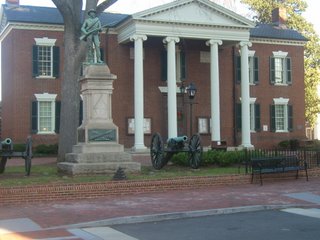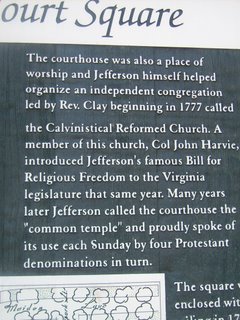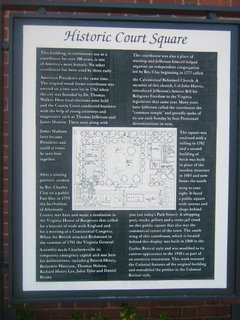


Some more thoughts churned up by the comments posted on Pagan Evangelism. In that conversation, I made the following comment: "By the way, how do we think our nation arrived at this position where there is freedom of religious expression? It came through the influence of Christians in the nation's founding." I immediately received a number of reprimands. Here are a few:
- In fact, it has always been my understanding, from my US History studies, that the establishment clause of the 1st amendment was influenced most by the Deistic members of the Continental Congress. Men like Ethan Allen, Thomas Paine, James Madison, and Thomas Jefferson, among others. Okay, it's debatable as to whether Jefferson was really a Deist, but he did coin the term "separation of church and state."
- Sorry, but this statement is contradicted by historical fact. Deists such as Jefferson, Madison, Washington, et al., saw so much violence and intolerance engendered by the various Christian sects in Europe that they realized that a secular nation was the only form in which this country could endure.
- While the majority of individuals in our nation are Christians, this nation wasn't founded upon Christianity, but upon the Enlightenment, which included an explicit rejection of the idea that certain religions should be given special consideration by the government.This is the nation you are living in. It is a secular one, and has been since day one. Much like your hypothetical Christian in India, you are a stranger in a strange land (you just have a rather large expat community here with you.)
- The singular mistake you continue to make is that the founding law of this country was based on Christian principles, bound by Christian law, and answerable to the Christian God -- and this is entirely wrong. The Founders instituted freedom of religion not in the least to ensure freedom from religion, and to ensure that the bloody internecine warfare of the 16th and 17th century did not repeat itself in the New World.
- To say Christianity was behind this is a pretty wild distortion.
- Now, return to the question at hand. It is not "What influenced the Founders?" It's "What's responsible for religious toleration in the US?" And I'll eat my hat if the answer "Christianity is responsible for religious toleration in the US" is anything but a half-truth at best and a lie at worst.I fully grant that early America was super-religious and super-Christian. Now, if you want to show that religious toleration comes from Christianity, from the hyper-Calvinists and Anglicans and Methodists, then go ahead. I'll admit William Penn as a religious defender of toleration, but you can't exactly chalk up the radical social doctrines of Quakers to Christianity. I'll stand by my claim of religious toleration coming from highly unorthodox Christians and Christianity-denying Enlightenment figures.
Those who live in Charlottesville might appreciate taking a stroll through Court Square and reading the historic marker there which notes Thomas Jefferson’s role in the 1777 organization of a "Calvinistical Reformed Church" led by Rev. Charles Clay and meeting in the County Courthouse. Notice also that it was a member of this Calvinistic congregation, Col. John Harvie, who introduced Jefferson’s Bill for Religious Freedom in the Virginia Legislature in 1777. Note also how Jefferson referred to the Courthouse as a "common temple" and was proud of its use each Sunday by no less than four Protestant churches in turn.
Why did religious freedom arise in America? Was it because of free-thinking Deists or was it because of committed, Scripture saturated Christians?
For more photos from Charlottesville’s Court Square, check out this photo album.
JTR
4 comments:
Is this the same Jefferson which also said "The whole history of these books [the Gospels] is so defective and doubtful that it seems vain to attempt minute enquiry into it: and such tricks have been played with their text, and with the texts of other books relating to them, that we have a right, from that cause, to entertain much doubt what parts of them are genuine. In the New Testament there is internal evidence that parts of it have proceeded from an extraordinary man; and that other parts are of the fabric of very inferior minds. It is as easy to separate those parts, as to pick out diamonds from dunghills." -Thomas Jefferson, letter to John Adams, January 24, 1814
Dear sir, I think you've greatly mischaracterized Jefferson's religion. You need not take my word for it, or that of a single quote. Read the page about Jefferson's religion at Monticello:
http://www.monticello.org/reports/interests/religion.html
He was hardly the good "committed, Scripture saturated Christian" that you make him out to be. After all, if Catholics aren't Christian (as you've claimed in other blog entries) then certainly Jefferson's radical beliefs, which denied the divinity of Jesus, certainly shouldn't qualify as Christian either.
Anon,
I am not claiming that Jefferson was a Christian. No doubt, he was not, and, as you rightly point out, his cut-and-paste Bible demonstrates his rejection of Scripture's authority.
My point is that Jefferson was influenced by (and had influence upon) evangelical Christians (like the Rev. Clay and Col.Harvie from the "Calvinistical" Church). Further, it was the largely Protestant (not Deist) citizenry who gave us the foundation of religious liberty. These are the committed, Scripture soaked believers of whom I wrote (not Jefferson!).
JTR
Is the Rev Charles Clay the same Charles Clay who was born 1715 and died 1789 and was married to Martha Green?
Thank you!
Laura Clay Ballard
Laura,
I don't know the answer to that one. I was just going on the info posted on the historical markers at the Courthouse. I'd love to know more about Clay and the "Calvinistical" church that met at the Courthouse.
JTR
Post a Comment